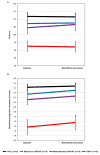The impact of psychosis on the course of cognition: a prospective, nested case-control study in individuals at clinical high-risk for psychosis
- PMID: 26169626
- PMCID: PMC4790441
- DOI: 10.1017/S0033291715001233
The impact of psychosis on the course of cognition: a prospective, nested case-control study in individuals at clinical high-risk for psychosis
Abstract
Background: Although cognitive deficits in patients with schizophrenia are rooted early in development, the impact of psychosis on the course of cognitive functioning remains unclear. In this study a nested case-control design was used to examine the relationship between emerging psychosis and the course of cognition in individuals ascertained as clinical high-risk (CHR) who developed psychosis during the study (CHR + T).
Method: Fifteen CHR + T subjects were administered a neurocognitive battery at baseline and post-psychosis onset (8.04 months, s.d. = 10.26). CHR + T subjects were matched on a case-by-case basis on age, gender, and time to retest with a group of healthy comparison subjects (CNTL, n = 15) and two groups of CHR subjects that did not transition: (1) subjects matched on medication treatment (i.e. antipsychotics and antidepressants) at both baseline and retesting (Meds-matched CHR + NT, n = 15); (2) subjects unmedicated at both assessments (Meds-free CHR + NT, n = 15).
Results: At baseline, CHR + T subjects showed large global neurocognitive and intellectual impairments, along with specific impairments in processing speed, verbal memory, sustained attention, and executive function. These impairments persisted after psychosis onset and did not further deteriorate. In contrast, CHR + NT subjects demonstrated stable mild to no impairments in neurocognitive and intellectual performance, independent of medication treatment.
Conclusions: Cognition appears to be impaired prior to the emergence of psychotic symptoms, with no further deterioration associated with the onset of psychosis. Cognitive deficits represent trait risk markers, as opposed to state markers of disease status and may therefore serve as possible predictors of schizophrenia prior to the onset of the full illness.
Keywords: Clinical high risk; linear mixed-effects models; nested case-control study; neurocognition; prodromal; psychosis.
Conflict of interest statement
Drs. Carrión, Auther, and Ms. Olsen and McLaughlin report no financial relationships with commercial interests. Dr Cornblatt was the original developer of the CPT-IP and has been an advisor for Hoffmann-La Roche. Dr Correll has been a consultant and/or advisor to or has received honoraria from: Alkermes, Bristol-Myers Squibb, Eli Lilly, Genentech, Gerson Lehrman Group, IntraCellular Therapies, Janssen/J&J, Lundbeck, MedAvante, Medscape, Otsuka, Pfizer, ProPhase, Roche, Sunovion, Supernus, and Takeda. He has received grant support from the American Academy of Child and Adolescent Psychiatry BMS, Janssen/J&J, National Institute of Mental Health (NIMH), Novo Nordisk A/S, Otsuka, Takeda and the Thrasher Foundation.
Figures
Similar articles
-
From the psychosis prodrome to the first-episode of psychosis: No evidence of a cognitive decline.J Psychiatr Res. 2018 Jan;96:231-238. doi: 10.1016/j.jpsychires.2017.10.014. Epub 2017 Oct 19. J Psychiatr Res. 2018. PMID: 29121595 Free PMC article. Clinical Trial.
-
Association of Neurocognition With Transition to Psychosis: Baseline Functioning in the Second Phase of the North American Prodrome Longitudinal Study.JAMA Psychiatry. 2016 Dec 1;73(12):1239-1248. doi: 10.1001/jamapsychiatry.2016.2479. JAMA Psychiatry. 2016. PMID: 27806157 Free PMC article.
-
Neurocognitive function as a possible marker for remission from clinical high risk for psychosis.Schizophr Res. 2014 Mar;153(1-3):48-53. doi: 10.1016/j.schres.2014.01.018. Epub 2014 Feb 13. Schizophr Res. 2014. PMID: 24529365
-
Neurocognition in clinical high risk young adults who did or did not convert to a first schizophrenic psychosis: a meta-analysis.Schizophr Res. 2013 Sep;149(1-3):48-55. doi: 10.1016/j.schres.2013.06.017. Epub 2013 Jul 5. Schizophr Res. 2013. PMID: 23830855 Review.
-
Neuropsychological Performance Among Individuals at Clinical High-Risk for Psychosis vs Putatively Low-Risk Peers With Other Psychopathology: A Systematic Review and Meta-Analysis.Schizophr Bull. 2022 Sep 1;48(5):999-1010. doi: 10.1093/schbul/sbac031. Schizophr Bull. 2022. PMID: 35333372 Free PMC article.
Cited by
-
Twelve-Month Cognitive Trajectories in Individuals at Ultra-High Risk for Psychosis: A Latent Class Analysis.Schizophr Bull Open. 2022 Jan 13;3(1):sgac008. doi: 10.1093/schizbullopen/sgac008. eCollection 2022 Jan. Schizophr Bull Open. 2022. PMID: 39144786 Free PMC article.
-
Global and Specific Profiles of Executive Functioning in Prodromal and Early Psychosis.Front Psychiatry. 2019 May 21;10:356. doi: 10.3389/fpsyt.2019.00356. eCollection 2019. Front Psychiatry. 2019. PMID: 31178768 Free PMC article.
-
From the psychosis prodrome to the first-episode of psychosis: No evidence of a cognitive decline.J Psychiatr Res. 2018 Jan;96:231-238. doi: 10.1016/j.jpsychires.2017.10.014. Epub 2017 Oct 19. J Psychiatr Res. 2018. PMID: 29121595 Free PMC article. Clinical Trial.
-
Deviant cortical sulcation related to schizophrenia and cognitive deficits in the second trimester.Transl Neurosci. 2020 Jul 15;11(1):236-240. doi: 10.1515/tnsci-2020-0111. eCollection 2020. Transl Neurosci. 2020. PMID: 33312722 Free PMC article.
-
A randomized controlled trial of Goal Management Training for executive functioning in schizophrenia spectrum disorders or psychosis risk syndromes.BMC Psychiatry. 2022 Aug 28;22(1):575. doi: 10.1186/s12888-022-04197-3. BMC Psychiatry. 2022. PMID: 36031616 Free PMC article. Clinical Trial.
References
-
- Becker HE, Nieman DH, Wiltink S, Dingemans PM, van de Fliert JR, Velthorst E, de Haan L, van Amelsvoort Ta, Linszen DH. Neurocognitive functioning before and after the first psychotic episode: does psychosis result in cognitive deterioration? Psychological Medicine. 2010;40:1599–1606. - PubMed
-
- Bilder RM, Lipschutz-Broch L, Reiter G, Geisler SH, Mayerhoff DI, Lieberman JA. Intellectual deficits in first-episode schizophrenia: evidence for progressive deterioration. Schizophrenia Bulletin. 1992;18:437–448. - PubMed
-
- Bora E. Developmental lag and course of cognitive deficits from the premorbid to postonset period in schizophrenia. American Journal of Psychiatry. 2014;171:369. - PubMed
-
- Bora E. Neurodevelopmental origin of cognitive impairment in schizophrenia. Psychological Medicine. 2015;45:1–9. - PubMed
Publication types
MeSH terms
Grants and funding
LinkOut - more resources
Full Text Sources
Medical
Research Materials


